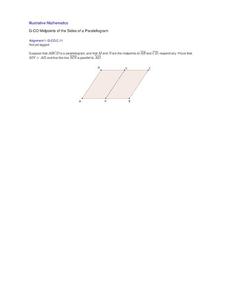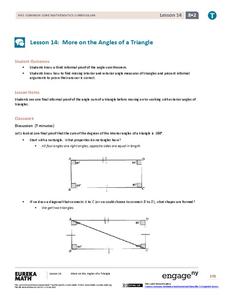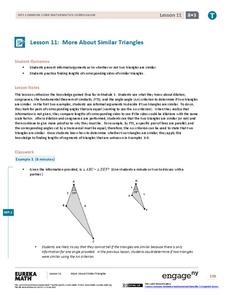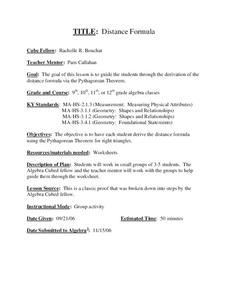Curated OER
The Product and Quotient Rules
In this product and quotient rules instructional activity, students use Taylor's Theorem to rewrite functions in a given form. They determine the derivatives of functions. This three-page instructional activity contains explanations,...
Curated OER
The Product and Quotient Rules
In this produce and quotient rule worksheet, students identify the values of given limits. They justify given proofs and explore the derivative of the sine and tangent functions. This three-page worksheet contains explanations,...
Curated OER
Drawing Straws
Fourth graders examine the Triangle Inequality Theorem by investigating possible lengths of the sides of a triangle.
Curated OER
Self-Check for Triangle Congruence Proofs Multiple Choice
In this triangle congruence worksheet, learners select the postulate that is being illustrated to prove congruence between triangles. The worksheet is self-scoring. Once students select the "check your work" link, they are given their...
Curated OER
Right Triangle congruence
Students will determine if two triangles are congruent and which property is used. In this lesson on right triangles, students will determine what additional information is need to make a pair of triangles congruent.
Curated OER
Indirect Proof and Inequalities in One Triangle
In this geometry worksheet, 10th graders order the sides and angles of a triangle and determine the range of the third side of a triangle given the lengths of two sides. The one page worksheet contains sixteen questions. ...
Curated OER
More Congruent Triangles
In this congruent triangles worksheet, 10th graders solve 6 various forms of problems that include a proof and a word problem. First, they draw and label triangles and indicate the additional pairs of corresponding parts that would have...
Curated OER
Using Properties Multiple Choice
In this geometry worksheet, students identify the different properties to represent a given statement. They use proof to show how they arrived at their answer. There are 5 questions with an answer key.
Curated OER
Time-Axis Fallacy and Bayes Theorem
Learners determine that knowledge of an event's outcome can affect the probability of the unknown outcome of an event that has already occurred.
Curated OER
Worksheet 1
In this math worksheet, students give examples of functions that will satisfy given conditions. Students tell the tabulations for a given function. Students use the definition of a derivative to compute the inverse of a function. they...
Illustrative Mathematics
Midpoints of the Sides of a Paralellogram
This task asks learners to prove that the segment joining the midpoints of two sides of a parallelogram is both congruent and parallel to an adjacent side of the parallelogram. The activity would be good to use in a discussion about how...
University of California
Euclidean Geometry
Go back to where it all began! Investigate how axiomatic systems and Euclidean geometry are based on undefined terms, common notions, postulates, and propositions by examining passages from Euclid's Elements. (Social studies teachers...
Inside Mathematics
Quadrilaterals
What figure is formed by connecting the midpoints of the sides of a quadrilateral? The geometry assessment task has class members work through the process of determining the figure inscribed in a quadrilateral. Pupils use geometric...
Virginia Department of Education
Similar Triangles
Pupils work in pairs to investigate what it takes to prove that two triangles are similar. They work through various shortcuts to find which are enough to show a similarity relationship between the triangles. Small groups work with the...
EngageNY
More on the Angles of a Triangle
Angles and triangles: they're all connected. Uncover the connections between angles in triangles. Scholars learn how to find both exterior and interior angle measures in triangles. The lesson emphasizes the vocabulary related to these...
EngageNY
Scale Factors
Is it bigger, or is it smaller—or maybe it's the same size? Individuals learn to describe enlargements and reductions and quantify the result. Lesson five in the series connects the creation of a dilated image to the result. Pupils...
Inside Mathematics
Rhombuses
Just what does it take to show two rhombuses are similar? The assessment task asks pupils to develop an argument to show that given quadrilaterals are rhombuses. Class members also use their knowledge of similar triangles to show two...
Mathematics Assessment Project
College and Career Readiness Mathematics Test A1
A six-page test covers content from several different high school math courses. It incorporates a few short answer, graphing, and word problems. It also allows room for mathematical reasoning and analysis.
EngageNY
More About Similar Triangles
Determine whether two triangles are similar. The lesson plan presents opportunities for pupils to find the criterion needed to show that two triangles are similar. Scholars use the definition of similarity to find any missing side...
EngageNY
Graphing Systems of Equations
Expand on learners' understanding of quadratic-linear systems. Building on the graphic understanding developed in the previous lesson, pupils learn algebraic methods of solving the systems.
EngageNY
Looking More Carefully at Parallel Lines
Can you prove it? Making assumptions in geometry is commonplace. This resource requires mathematicians to prove the parallel line postulate through constructions. Learners construct parallel lines with a 180-degree rotation and then...
Curated OER
Triangles
In this geometry worksheet, 10th graders solve problems involving triangular inequality. They apply the proofs and theorem of triangles to solve these problems. There is an overview and one question.
Curated OER
Distance Formula
Students calculate the distance between two points using the distance formula. In this geometry lesson, students derive the distance formula using the Pythagorean Theorem.
Curated OER
Map Coloring
For this math worksheet, students create a map using different colors. They use a specific pattern and can use only four colors. This worksheet is a proof of the making of a map using no more than 4 colors. There is an answer key.

























